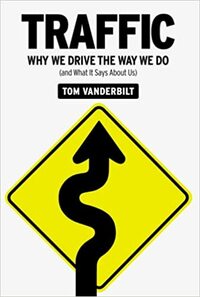You need to sign in or sign up before continuing.
Take a photo of a barcode or cover
Wasn't vibing with the narrator and it's a 14 hour audiobook so I decided to cut my losses early.
informative
medium-paced
informative
medium-paced
informative
reflective
medium-paced
I enjoyed the information density of this book. The topics discussed and the reliance on extensive real-world research lends to the overall credibility of the author to convey all the reasons why we drive the way we do. This information density extends to the end notes, which is the source of my primary complaint about the book; the end notes are often as information dense as the text, which encouraged me to flip back and forth multiple times on the same page of text. This created a stuttering reading experience that undercut the author’s smooth writing style. I would have liked the end notes to have been numbered in the text like in academic monographs so I could better balance the text and the lengthier end notes. In addition, I also didn’t for portions of the discussions on how gender affects driving as some of the conclusions bordered on gender essentialism. Still, for anyone wanting insight into the mysteries of why people act the way they do on the road, I’d recommend the book heartily.
This is an interesting topic, and I appreciate the array of studies that author Tom Vanderbilt has assembled for the task, but I find many of his arguments hard to parse, reliant on unjustified assumptions, and frankly somewhat repetitive. I also think he stretches in tying local traffic norms to purported cultural values such as individualism or civic corruption, and I feel that his critiques of innovative technologies like GPS navigation and self-driving cars have proven overly pessimistic since the book's publication in 2008. So overall, this has been something of a disappointing read.
Find me on Patreon | Goodreads | Blog | Twitter
Find me on Patreon | Goodreads | Blog | Twitter
A well-written look at the world of driving -- something that many people in America do, but don't think enough about.
Rather than dwell on the emotional, economic and environmental problems that traffic causes, Vanderbilt talks to traffic engineers, psychologists, driving instructors and others to figure out what makes us drive the way we do.
My favorite chapter covered differences in driving around the world. The explanation about how corruption and traffic fatalities are correlated is fascinating. I also enjoyed reading about the Dutch architect who convinced a town to increase safety by getting rid of all the traffic signs. It worked!
Rather than dwell on the emotional, economic and environmental problems that traffic causes, Vanderbilt talks to traffic engineers, psychologists, driving instructors and others to figure out what makes us drive the way we do.
My favorite chapter covered differences in driving around the world. The explanation about how corruption and traffic fatalities are correlated is fascinating. I also enjoyed reading about the Dutch architect who convinced a town to increase safety by getting rid of all the traffic signs. It worked!
Interesting, might be easier to listen to as an audiobook
I've always been really interested in the science behind traffic and lamented not taking a class or two on the topic while in college. However this book by Vanderbilt definitely appeased my appetite regarding the psychology, statistics, and science behind everything traffic-related. The book really touched on a lot of different topics, which might be surprising since the topic can at first glance seem pretty mundane and not terribly varied.
As someone who's very in favor of and excited for a future of driverless cars (which this book didn't talk about at all until the epilogue, likely because it was written almost 10 years ago when such an idea was more far-fetched), much of this book only served to make me yearn for this change to come more quickly.
Rest assured, many of the topics presented in this book will become fodder for when this topic comes up with people who are leery about this future that excites me: the idea that human mistakes are so responsible for both crashes and traffic which can be very clearly improved upon using computers, the psychology behind humans acting differently than they would in face-to-face interactions because cars grant you anonymity, the Nash-ian/tragedy of the commons issue of people acting in their own self-interest on the road despite it being harmful to the overall flow of traffic, the risk homeostasis that human brains operate under that means we act more riskily than we should because we feel protected with improved car safety features, the cultural differences in driving that exist in different communities.
So not only does it excite me even more for driverless cars and serve as interesting thought nuggets anytime you're in the car or even near traffic as a pedestrian, but it also is definitely somewhat scary to realize exactly what's going on on those roads that all seem so normal and typical to us. But if the topic at all interests you, I'd definitely give this book a go!
As someone who's very in favor of and excited for a future of driverless cars (which this book didn't talk about at all until the epilogue, likely because it was written almost 10 years ago when such an idea was more far-fetched), much of this book only served to make me yearn for this change to come more quickly.
Rest assured, many of the topics presented in this book will become fodder for when this topic comes up with people who are leery about this future that excites me: the idea that human mistakes are so responsible for both crashes and traffic which can be very clearly improved upon using computers, the psychology behind humans acting differently than they would in face-to-face interactions because cars grant you anonymity, the Nash-ian/tragedy of the commons issue of people acting in their own self-interest on the road despite it being harmful to the overall flow of traffic, the risk homeostasis that human brains operate under that means we act more riskily than we should because we feel protected with improved car safety features, the cultural differences in driving that exist in different communities.
So not only does it excite me even more for driverless cars and serve as interesting thought nuggets anytime you're in the car or even near traffic as a pedestrian, but it also is definitely somewhat scary to realize exactly what's going on on those roads that all seem so normal and typical to us. But if the topic at all interests you, I'd definitely give this book a go!
Loved this book. Made a mundane subject quite interesting and also made me aware of both my individual habits and gave me a perspective on wider traffic patterns. That might sound boring but it was well-written and engaging.




